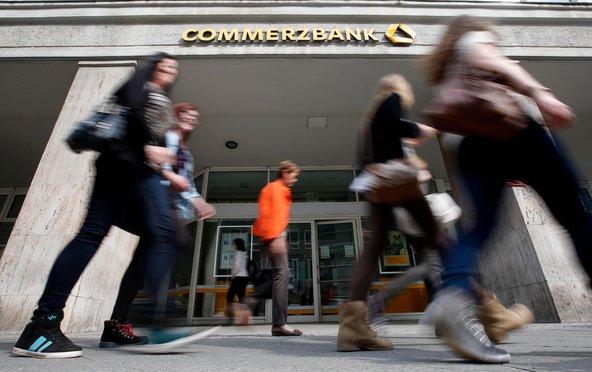 Fabrizio Bensch/ReutersA branch of Commerzbank in Berlin.
Fabrizio Bensch/ReutersA branch of Commerzbank in Berlin.
LONDON – European banks have gone on a capital-raising binge.
Commerzbank of Germany, the latest entrant, began a heavily-discounted effort on Tuesday to raise 2.5 billion euros ($3.2 billion) in new capital.
The push by Commerzbank follows similar moves by other European lenders, which have come under growing regulatory pressure to increase capital reserves to protect against future financial shocks.
Despite a series of stress tests on the Continent’s largest financial institutions, investors have remained wary of the firms’ continued exposure to risky loans and sputtering economies like Spain and Greece.
Regulators have also pushed banks to shed unprofitable assets and protect against rising delinquent loans, and a proposed banking union for the euro zone is expected to lead to even greater scrutiny of balance sheets. Authorities want to ensure that banks meet stringent capital requirements outlined in new rules known as Basel III.
Under the rules, which are to come into force by 2019, firms must achieve a 7 percent core Tier 1 ratio, a measure of an institution’s financial health. Banks considered to be systemically important must hold an additional 1 to 2.5 percent in reserve.
As a result, banks have been pulling out all the stops to meet the capital demands. Last month, Deutsche Bank raised almost 3 billion euros through a rights issue specifically intended to improve its capital buffers.
The British bank Barclays has issued a number of contingent capital instruments – known as CoCos – that will wipe out investors if the firm’s core Tier 1 ratio falls below a certain level. A number of other banks, including Credit Suisse and BBVA of Spain, also have raised capital by this method.
The Swiss bank UBS, which announced a major restructuring last year, has a 10.1 percent core Tier 1 ratio. That is currently the highest figure among Europe’s largest banks, according to the data provider SNL Financial. Other big banks, including Deutsche Bank and HSBC, have ratios above 9.5 percent.
For Commerzbank, whose current core Tier 1 capital ratio of 7.5 percent is expected rise to 8.4 percent after its capital-raising effort is completed, the new funds will help to repay an 18 billion euro government bailout the firm received in 2009.
“The transaction marks the beginning of the federal government’s exit from Commerzbank,” the bank said in a statement. “The capital structure of the bank is improving considerably.”
The offering – the bank’s fifth since 2010 – allows investors to buy 20 shares at 4.50 euros apiece for every 21 shares they already hold. The price represents a discount of about 55 percent on Commerzbank’s closing share price on Monday. The bank’s shares fell 3.8 percent in afternoon trading in Frankfurt on Tuesday.
As part of the deal, Commerzbank is reportedly in talks to sell 5.7 billion euros of British property loans to the American bank Wells Fargo and the investment firm Lone Star.
More capital-raising moves are expected. British banks, for example, must raise a combined £25 billion ($38 billion) by the end of the year, according to local regulators. That includes potentially raising up to £1.8 billion, according to banking analysts at Barclays, for the small British lender Co-Operative Banking Group, which was downgraded to junk status last week by the credit rating agency Moody’s Investors Service over concerns about an increase in delinquent loans.
Commerzbank, Deutsche Bank, Citigroup and HSBC are the book-runners for Commerzbank’s capital-raising effort, which the bank said would close on May 28.
Article source: http://dealbook.nytimes.com/2013/05/14/commerzbank-to-raise-3-2-billion-in-new-capital/?partner=rss&emc=rss
